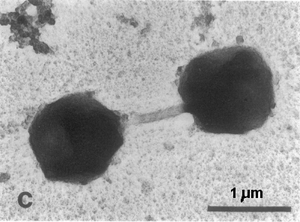Hyperthermus: Difference between revisions
From MicrobeWiki, the student-edited microbiology resource
| Line 29: | Line 29: | ||
==Ecology== | ==Ecology== | ||
The strains of ''Hyperthermus butylicus'' were isolated from the sea floor of a hot, solfataric babitat on the coast of São Miguel Island in Azores, Portugal. With its ability to live at the temperature of 106°C, it is one of the most thermophilic archaea isolated so far. | The strains of ''Hyperthermus butylicus'' were isolated from the sea floor of a hot, solfataric babitat on the coast of São Miguel Island in Azores, Portugal. With its ability to live at the temperature of 106°C, it is one of the most thermophilic archaea isolated so far. Also, interestingly, despite its being found in a marine environment, | ||
==References== | ==References== | ||
[http://www.ncbi.nlm.nih.gov/entrez/query.fcgi?cmd=Retrieve&db=PubMed&dopt=Abstract&list_uids=2113915 Zillig, W., Holz, I., Janekovic, D., Klenk, H., Imsel, E., Trent, J., Wunderl, S., Fojaz, V. H., Coutinho, R., and Ferreira, T."''Hyperthermus butylicus'', a Hyperthermophilic Sulfur-Reducing Archaebacterium That Ferments Peptides." ''Journal of Bacteriology''. July, 1990. Volume 172, Number 7. p. 3959-3965.] | [http://www.ncbi.nlm.nih.gov/entrez/query.fcgi?cmd=Retrieve&db=PubMed&dopt=Abstract&list_uids=2113915 Zillig, W., Holz, I., Janekovic, D., Klenk, H., Imsel, E., Trent, J., Wunderl, S., Fojaz, V. H., Coutinho, R., and Ferreira, T."''Hyperthermus butylicus'', a Hyperthermophilic Sulfur-Reducing Archaebacterium That Ferments Peptides." ''Journal of Bacteriology''. July, 1990. Volume 172, Number 7. p. 3959-3965.] | ||
Revision as of 20:33, 20 June 2006
|
NCBI: |

Electron micrographs of H. butylicus. a: Single cell with pili; b: Duplex form; c: Cells connected by a string of cytoplasm; d: Cell with a tail; e: Ghost exhibiting an S layer; f: Duplex form exhibiting an S layer and vacuoles. From Zillig, W. et al. "Hyperthermus butylicus, a Hyperthermophilic Sulfur-Reducing Archaebacterium That Ferments Peptides." J. of Bacteriol. July, 1990. Vol. 172, No. 7. p. 3962.
Classification
Higher order taxa
Archaea; Crenarchaeota; Thermoprotei; Desulfurococcales; Pyrodictiaceae
Species
Hyperthermus butylicus
Description and significance
Hypperthermus is a hyperthermophilic, sulfur reducing archaeon that grows between 95 and 106°C and at pH of 7.0.
Genome structure
The genome of Hyperthermus is currently being sequenced by the group from the University of Copenhagen. The G + C content of the DNA is around 55%.
Cell structure and metabolism
Ecology
The strains of Hyperthermus butylicus were isolated from the sea floor of a hot, solfataric babitat on the coast of São Miguel Island in Azores, Portugal. With its ability to live at the temperature of 106°C, it is one of the most thermophilic archaea isolated so far. Also, interestingly, despite its being found in a marine environment,
